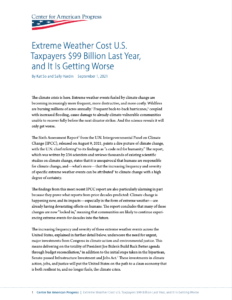Full Title: Extreme Weather Cost U.S. Taxpayers $99 Billion Last Year, and It Is Getting Worse
Author(s): Kat So, Sally Hardin
Publisher(s): Center for American Progress
Publication Date: September 1, 2021
Full Text: Download Resource
Description (excerpt):
The climate crisis is here. Extreme weather events fueled by climate change are becoming increasingly more frequent, more destructive, and more costly. Wildfires are burning millions of acres annually. Frequent back-to-back hurricanes, coupled with increased flooding, cause damage to already-climate-vulnerable communities unable to recover fully before the next disaster strikes. And the science reveals it will only get worse.
The Sixth Assessment Report from the U.N. Intergovernmental Panel on Climate Change (IPCC), released on August 9, 2021, paints a dire picture of climate change, with the U.N. chief referring to its findings as “a code red for humanity.” The report, which was written by 234 scientists and reviews thousands of existing scientific studies on climate change, states that it is unequivocal that humans are responsible for climate change, and—what’s more—that the increasing frequency and severity of specific extreme weather events can be attributed to climate change with a high degree of certainty.
With that in mind, this issue brief takes a closer look at extreme weather events by the numbers over the past four decades; explains the different categories of extreme weather that the National Oceanic and Atmospheric Administration (NOAA) catalogs, analyzing how each is exacerbated by the climate crisis; and recommends that Congress make significant investments to lessen the human and infrastructure costs that result from these catastrophic events, while transforming the nation’s economy to one that is 100 percent clean.
